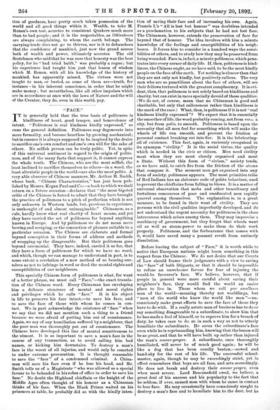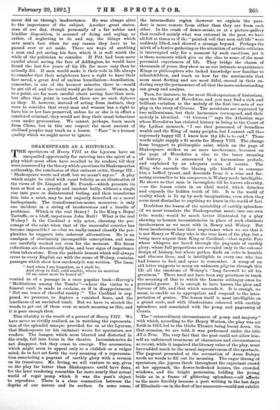"FACE."
TT is generally held that the true basis of politeness is kindliness of heart, good temper, and benevolence of intent. "Politeness is real kindness kindly expressed," so runs the general definition. Politeness may degenerate into mere formality, and become heartless by growing mechanical; but in essence it is always supposed to be inspired by the desire to sacrifice one's own comfort and one's own will for the sake of others. No selfish person can be truly polite. Yet, in spite of this universal sentiment in regard to the origin of polite- ness, and of the many facts that support it, it cannot express the whole truth. The Chinese, who are the most selfish, the least inclined to sacrifice themselves to others—in a word, the least altruistic people in the world—are also the moat polite. A very able observer of Chinese manners, Mr. Arthur H. Smith, whose book, "Chinese Characteristics," has just been pub- lished by Messrs. Kegan Paul and Co.—a book to which we shall return on a future occasion—declares that "the most bigoted critic of the Chinese is forced to admit that they have brought the practice of politeness to a pitch of perfection which is not only unknown in Western lands, but, previous to experience, is unthougbt of and almost unimaginable." Chinamen, as a rule, hardly know what real charity of heart means, and yet they have carried the art of politeness far beyond anything known in Europe. And by politeness we do not mean mere bowing and scraping, or the concoction of phrases suitable to a particular occasion. The Chinese are elaborate and formal beyond conception in their forms of address and methods of wrapping up the disagreeable. But their politeness goes beyond ceremonial. They have, indeed, carried it so far, that they have a form of politeness for which we have no word, and which, though we can manage to understand in part, is to some extent a revelation of a new method of so bearing our- selves as not to infringe in word or deed the mental rights and susceptibilities of our neighbours.
This specially Chinese form of politeness is what, for want of a better phrase, we must call "Face,"—the exact transla- tion of the Chinese word. Every Chinaman has enveloping him a delicate structure of mental and moral rights and privileges which he calla "face." It is his object in life to preserve his face intact,—to save his face, and to save the face of those with whom he comes in con- tact. We in part acknowledge the existence of " face " when we say that we did not mention such a thing to a friend because we were afraid of putting him out of countenance. Again, we say of any humiliation suffered by a neighbour, that the poor man was thoroughly put out of countenance. The Chinese have developed this line of mental sensitiveness to the utmost. It is as important to save a man's face in the course of any transaction, as to avoid calling him bad names, or kicking him downstairs. To destroy a man's face is the worst of all injuries, and would only be resorted to under extreme provocation. It is thought reasonable to save the " face '! of a condemned criminal. A China- man will save his face even if he lose his head, and Mr. Smith tells us of a Magistrate "who was allowed as a special favour to be beheaded in his robes of office in order to save his face." No doubt the Highland chieftain or the knight of the Middle Ages often thought of his honour as a Chinaman thinks of his face. When the Black Prince waited on his prisoners at table, he probably did so with the kindly inten- tion of saving their face and of increasing his own. Again, Francis L's "Allis lost but honour" was doubtless intended as a proclamation to his subjects that he had not lost face. The Chinaman, however, extends the preservation of face far beyond that of honour. The idea involves with him a minute knowledge of the feelings and susceptibilities of his neigh- bours. It forces him to consider in a hundred ways the sensi- bilities of others, and to study how they may be preserved from being wounded. Face is, in fact, a minute politeness, which pene- trates into every corner of daily life. If, then, politeness is kind- liness, the Chinese ought, as we have said, to be the most kindly people on the face of the earth. Yet nothing is clearer than that they are not only not kindly, but positively callous. The very men who are so punctilious about the face of others, will see their fellows tortured with the greatest complacency. It is evi- dent, then, that politeness is not solely based on kindliness and charity, but can exist in races specially devoid of those qualities. (We do not, of course, mean that no Chinaman is good and charitable, but only that callousness rather than kindliness is the mark of the race.) What, then, is politeness if it is not "real kindness kindly expressed"? We expect that it is essentially the smoother of life, the word probably coming, not from ;rat; a city, but from polio, to smooth. Politeness is based upon the necessity that all men feel for something which will make the wheels of life run smooth, and prevent the friction of personal contact breaking out into fire. It is the lubricating- oil of existence. This fact, again, is curiously recognised in its synonym "civility." It is the social virtue, the quality which is needed in the civis or citizen. Men need civility most when they are most closely organised and most a State. Without this form of " civism," society tends, as we have said, to catch fire from the friction of the atoms that compose it. The moment men get organised into any form of society, politeness appears. The most primitive tribe of Red Indians has an elaborate code of polite behaviour, used to prevent the chieftains from falling to blows. It is a matter of universal observation that mobs and other tumultuary and fortuitous concourses of poor and uneducated men rapidly quarrel among themselves. The explanation is, in a great measure, to be found in their want of civility. They are persons with the civil qualities imperfectly developed, and do not understand the urgent necessity for politeness in the close intercourse which arises among them. They may improvise a machinery of government, but they forget that wheels want oil as well as steam-power to make them do their work properly. Politeness, and the forbearance that comes with it, would have saved many a peasant revolt from untimely dissolution.
Before leaving the subject of "Face," it is worth while to notice that European nations might learn something in this respect from the Chinese. We do not desire that our Courts of Law should frame their judgments with a view to saving the "face" of both litigants, or that it should be impossible to refuse an unwelcome favour for fear of injuring the would-be favourer's face. We believe, however, that if people in general were more careful about saving their neighbour's face, they would find the world an easier place to live in. Those whom we call par excellence men of the world—meaning thereby not worldlings, but "men of the world who know the world like men "—un- consciously make great efforts to save the face of those they have to do with. If a really astute man of business has to do or say something disagreeable to a subordinate, to show him that he has made a fool of himself, or to reprove him for a breach of duty, he takes care to do so in such a way as not to utterly humiliate the subordinate. He saves the subordinate's face even while he is reprimanding him, knowing that the lesson will be as great, and that he will have built up rather than injured the man's amour-propre. A subordinate, once thoroughly humiliated, will never be of much good again ; he will be like a dog that has been cruelly beaten,—cowed and hand-shy for the rest of his life. The successful school- master, again, though he may be exceedingly strict, yet in effect remembers that boys are all face, and acts accordingly. He does not break and destroy their amour propre, even when most severe. Lord Beaconsfield owed, we believe, a great deal of his success and his popularity to the fact that he seldom, if ever, caused men with whom he came in contact to lose face. He may occasionally have consciously sought to destroy a man's face and to humiliate him to the dust, but he never did so through inadvertence. He was always alive to the importance of the subject. Another great states- man of our day, though personally of a far nobler and kindlier disposition, is accused of doing and saying, or rather, of neglecting to do and say, the things which save men's face when for any reason they have to be passed over or set aside. There are ways of snubbing a man and yet saving his face, which it is well worth the while of the politician to consider. If Pitt had been more careful about saving the face of Addington, he would have found the last few years of his life far more easy than he actually did. If men would make it their rule in life always to consider that their neighbours have a right to have their face saved, a great deal of useless humiliation—humiliation, remember, is one of the keenest miseries there is—would be got rid of, and the world would go far easier. Women, up to a point, are far more careful about saving face than men, but after that point is reached, there are no such defacers as they. If, however, instead of acting from instinct, they were to consider that every man and woman has a right to have his or her face preserved, unless he or she is in effect a convicted criminal, they would not drop their usual behaviour even under provocation. We cannot, perhaps, learn much from China, but in this one respect the most ancient of civilised peoples may teach us a lesson. " Face " is a human quality which we ought never to ignore.



































 Previous page
Previous page